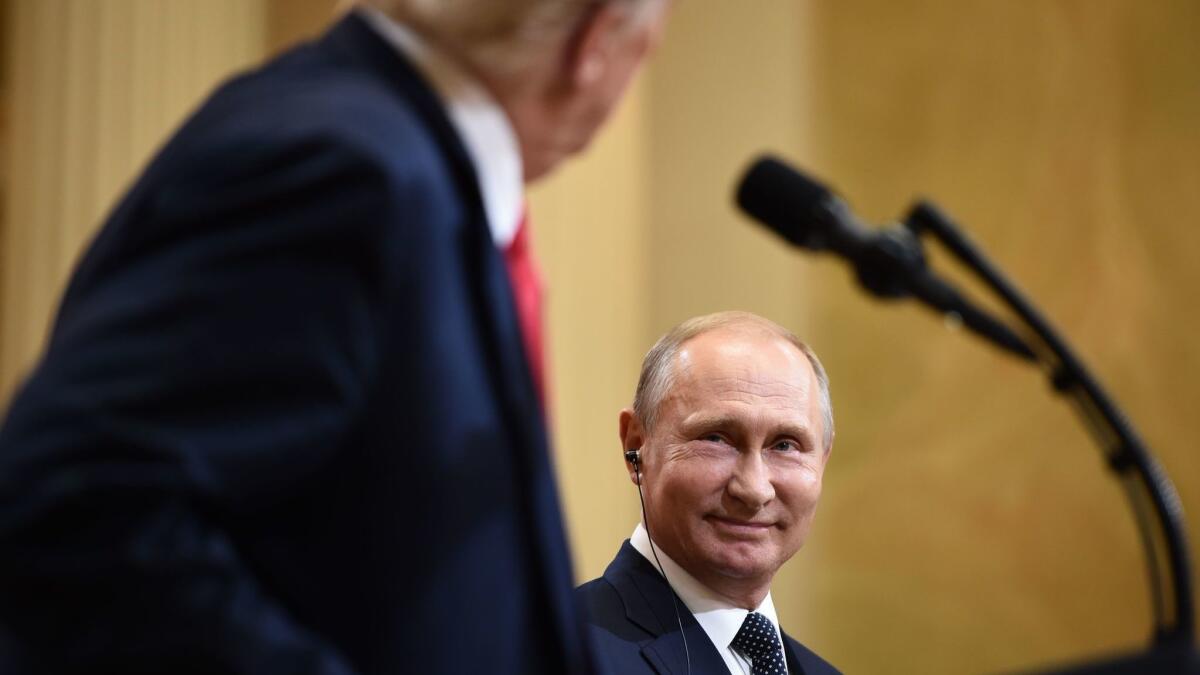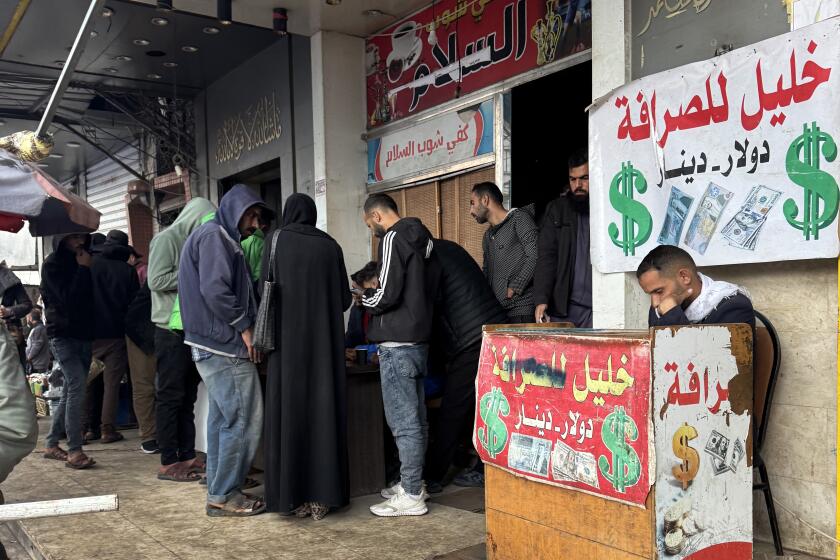‘Putin’s Poodle’ and other scathing comments emerge after Trump’s appearance in Helsinki

Reporting from London — The headlines were brutal.
“Best ally of Putin,” said Tuesday’s front page of France’s sober-minded Le Monde.
“Trump makes it easy for Putin,” echoed German’s Die Welt.
“Trump 0, Putin 1,” said the Finnish business daily Kauppalehti, playing off the just-concluded World Cup soccer tournament in Russia.
In globe-spanning day-after news coverage, Helsinki, the Finnish capital where Russian President Vladimir Putin and President Trump met Monday, suddenly became shorthand for what was widely described as a very bad day for the U.S. president.
The leading Italian daily Corriere della Sera said Helsinki marked an “American surrender,” describing Trump’s performance at a post-summit news conference as “obliging side man to a victorious Vladimir Putin.”
Traditional U.S. allies in Europe, having already absorbed a blast of criticism from Trump at last week’s NATO summit in Brussels, were dismayed anew by his seeming show of solidarity with Putin over the issue of election interference by Moscow.
Here’s how newspapers covered the Trump-Putin summit »
That issue hits close to home for key U.S. friends: European elections also have been hit by Russian cyberattacks, which previously have drawn strong pushback from leaders like France’s President Emmanuel Macron, German Chancellor Angela Merkel and British Prime Minister Theresa May.
In Washington on Tuesday, Trump — somewhat grudgingly — walked back his Helsinki comments, saying he accepted the U.S. intelligence community’s conclusion that Russia had interfered in the presidential vote. “Could be other people also,” he said. “A lot of people out there.”
But the summit’s impact lingered. Britain’s Guardian newspaper, in its lead headline on the Helsinki meeting, rolled out the T-word — “treasonous” — albeit in quotes.
Corriere della Sera summarized Putin’s stance as asserting “zero interference” in the 2016 U.S. vote. “Trump believes him,” it added flatly.
Bright reviews, not surprisingly, came in Russia, where Putin’s performance alongside Trump was hailed as a national triumph. The state-run newspaper Rossiyskaya Gazeta trumpeted: “The West’s attempts to isolate Russia failed.”
The Helsinki encounter also won plaudits on Europe’s far right. Italy’s hard-line Interior Minister Matteo Salvini, who was in Moscow to meet Russian officials, praised Russia for having a government “that acts in the interests of its people” and lamented that such behavior was “rare in Europe.”
Some took a long view — and a gloomy one — of the summit’s still-to-be-felt repercussions. Italian daily La Repubblica saw a symbolic end to the rules-based postwar world order.
“Do Trump and Putin have alternative plans to substitute it?” it asked in a front-page editorial. An op-ed in Le Monde called the Trump-Putin meeting a “dangerous liaison” for the entire world.
“Trump is praising Putin while at the same time he is constantly attacking without any reason America’s closest allies,” columnist Martin Klingst wrote in Germany’s Die Zeit online.
Another German commentator, Stefan Kornelius, wrote in the Munich-based Sueddeutsche Zeitung that the world’s fate lay in the hands of “two easily irritated senior citizens, one of whom is possibly somewhat smarter than the other.”
Britain’s tabloids, fresh from covering Trump’s tumultuous visit to the United Kingdom last week, had a field day.
“Putin’s poodle,” the Daily Mirror dubbed Trump. The Daily Express spoke of Putin’s “new best buddy” and had a double-page spread with the headline: “A nod and a wink ... and the Cold War ends.”
In an op-ed, the Guardian said Trump was inadvertently prescient when he previewed last week’s swing through Europe by saying the meeting with Putin would be the “easiest” of his stops.
“First rough up NATO in order to damage transatlantic commitments,” said an op-ed summing up the president’s seeming mission. “Then stir things up in Britain in order to damage the EU, and, finally, play the cooperative statesman in his talks with the Russian president.
“Or, to put it another way: bully, bully and cringe,” it said.
Other news outlets focused on national or regional interests in assessing the Putin-Trump meeting. Israel has grown increasingly alarmed about the presence of Iranian forces and allied militias in Syria. The Jerusalem Post noted praise for Israel, while saying the two leaders “diverge on Syria and Iran.”
Trump’s assertion that the United States and Russia could together address dire humanitarian conditions in Syria — where Moscow and the government of ally Bashar Assad have staged countless punishing airstrikes — were met with skepticism and derision by some human rights and opposition activists.
“Will you now explain how?” the pro-opposition Syria Campaign tweeted at Trump on Tuesday.
In Germany, where Foreign Minister Heiko Maas had weighed in Monday with a statement saying, “We can no longer fully rely on the White House,” some newspapers framed the summit as a meeting of minds — and one at odds with the European consensus. “Summit of the autocrats,” said the business daily Handelsblatt.
Some outlets stuck with a more straightforward approach in news coverage but paired that with scathing commentary.
The Irish Times, in a news story, cited a “barrage of US criticism” over Helsinki. But in a separate opinion piece by Washington-based columnist Suzanne Lynch, it called Trump’s performance “humiliating,” saying that the news conference “shows a rambling, inexperienced and amateur US president.”
In Finland’s Nordic neighbor Sweden, the largest-selling daily, Hufvudstadsbladet, featured a picture of Putin smiling alongside Trump. The headline read, “Trump was my favorite.”
Special correspondent Boyle reported from London and Times staff writer King from Washington. Staff writer Alexandra Zavis in Beirut and special correspondents Erik Kirschbaum in Berlin, Sabra Ayres in Helsinki and Tom Kington in Rome contributed to this report.
Special correspondent Boyle reported from London and Times staff writer King from Washington. Staff writer Alexandra Zavis in Beirut and special correspondents Erik Kirschbaum in Berlin, Sabra Ayres in Helsinki and Tom Kington in Rome contributed to this report.
UPDATES:
2:20 p.m.: This article was updated with additional headlines and comments from various countries.
This article was originally published at 10:30 a.m.
More to Read
Sign up for Essential California
The most important California stories and recommendations in your inbox every morning.
You may occasionally receive promotional content from the Los Angeles Times.










